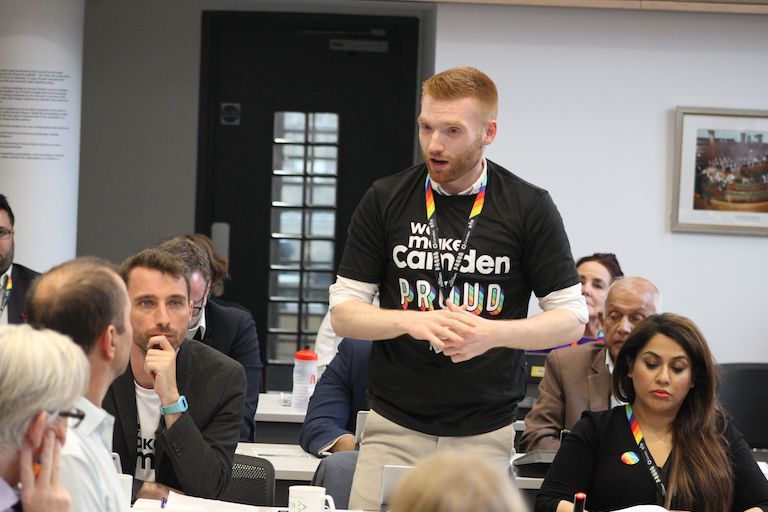Danny Beales: ‘I've been homeless… I know what it's like – that's what drives me'
Interview with the cabinet councillor fronting the CIP
Thursday, 4th August 2022 — By Richard Osley

Cabinet councillor Danny Beales
“I AM a socialist,” says the man fronting Camden’s list of regeneration projects, when asked for a label.
“I’d be happy with ‘pragmatic socialist’. I believe in socialised medicine, good public services, but my politics are not absolute. I think I’m open to compromise, which is fundamental to good politics.”
Quoted nearly every week in the New Journal as the decade-old debate rumbles on over how the council’s Community Investment Programme is applied, Danny Beales has emerged as one of the most high profile and influential councillors at the Town Hall.
Recently, he saw the business strategy for the wholesale redevelopment of the West Kentish Town Estate approved by his cabinet colleagues.
More than 500 new private homes will be built on a demolished and rebuilt site, but this in turn also pays for new flats for existing tenants who told the council last month that their estate is crumbling more with each passing year.
Cllr Beales’ opponents, some within his own party, may scoff at his use of the s-word – socialism.
His dislike of Jeremy Corbyn’s leadership of the party was barely concealed.
“There’s an inevitability about labels, people like shortcuts, “ he said in an interview with the New Journal, set up to explore what guides his choices.
“They like to understand things in simple ways. I always think I’m quite radical. My politics are very much based about where I come from and who I am and what I care about – and I fundamentally care about inequalities and child poverty.”
Often, Cllr Beales has spoken openly in council meetings about his own experiences with homelessness, including at last month’s sign-off meeting for the West Kentish Town project.
“I grew up in very Tory areas: Hillingdon and Northampton are not traditional Labour communities,” he said.
“My family predominantly are not Labour, despite us being quite poor. So growing up in that environment, I appreciate that not everyone thinks as I do, and just me asserting ‘right, socialism is the way forward’ doesn’t convince people.”
He added: “I think you have to kind of build coalitions, and you have to understand where people are coming from.”
He came to Camden around 12 years ago as the first in his family to go to university and credits his mother for an undying support when things were tough.
Twice made homeless from the private rented sector, first they moved in with his grandparents but on the second occasion went into the temporary accommodation system.
“We ended up in bed and breakfast,” he said.
“I remember seeing my Mum crying and the worry on her face, but you don’t fully get what’s going on at that age. You don’t get that when the bailiffs call, why you have to pretend to be out and turn the TV and lights off.
“You don’t fully understand the situation, but you sense the emotion and that sticks with you.”
Some security came when his mother finally managed to get a local authority flat in the Northampton area.
“Despite what had happened, I feel fortunate,” he said.
“We were fortunate to get a council house which was important to finding stability but I had a parent who believed in education and encouraged me, and I think so many people don’t have that and it affects children’s life chances.”
With thousands still waiting for a home in Camden, the aim is to provide the same platform for people growing up in uncertain circumstances now – the only thing is, there are differences of opinion about how to achieve this.
Critics in the Labour Party, several of whom stepped down at the recent council elections or were told they could not stand again, warn that the CIP hands too much away to private forces.
Its initial slang description as a ‘North Sea Oil’ strategy by Camden’s own leadership didn’t help – the brag being that the council had a blessed portfolio of high value land and properties to tap.

Cllr Beales has never used that term, but it was recalled as residents in Somers Town were told a new skyscraper of luxury flats on a green space would be the price for finally refurbishing Edith Neville School.
Some of the developments have raised little opposition, and awards have flowed for schemes like the Passivhaus homes built in Agar Grove.
Others have drawn criticism for how the deals are weighted and a scrutiny committee investigation into the future of the policy was held last year by a cross-party panel.
Cllr Beales, like some of his colleagues, feels much of the criticism comes from people who are neither on the waiting list or in cramped overcrowded homes.
“I think it’s easy to take stuff for granted, that you just accept as normal,” he said. “Like most people have a bedroom, most people do have a house where they would have friends visit.
“Most kids have a bedroom of their own and space to do homework. Generally people don’t appreciate how difficult it can be when three kids are sharing a bed.”
He added: “I’ve had to share a bed with my Mum. We couldn’t afford a bed and we slept on a duvet on the floor.”
Some of the bluntest debate on the CIP is online where Cllr Beales is cast as the villain figure for anybody who mistrusts the strategy.
“My sense is that most people who have that view about me – that I’m only interested in private deals, development, all those kind of things – well… I think it’s clearly obvious what my priorities are when I talk about the importance of building new council homes. But it’s difficult and it’s expensive, and there aren’t easy ways of doing it.”
Much of the CIP’s promotion has always been couched with the argument that this is the only way to lever in the investment needed for homes and community facilities while council budgets have been slashed during austerity years.
So, would the arrival of an incoming Labour government headed by Holborn and St Pancas MP Sir Keir Starmer change things and mean more direct investment and less of a role handed to private developers interested in their own returns..
“I am hopeful. Probably, my realistic side says that no government is going to say we’re going to give you all the money you need to meet your capital needs,” Cllr Beales said.
“But I think it’s certainly the case we’d see a lot more investment for affordable housing.”
And to that end, he says he sees the waiting list for homes as something that must be solved for all, even if that means building and building again to get everybody a home.
Or put simply, that ten years after it first began the CIP has no end date in sight.

An early council photo of Cllr Beales
The council is currently looking now at ‘small site’ projects to add blocks of new homes to existing estates and has plans to demolish and rebuild Wendling in Gospel Oak.
“I think it’s like saying there will always be people who are ill, so why does the NHS keep going? Well, of course the NHS keeps going. It’s its job to treat everybody on its waiting list,” he said. “That’s not saying that if it did that, there wouldn’t be more people wanting treatment.
“I think it’s the same thing for a housing service. It’s our job to make sure that everybody has decent, good quality, genuinely affordable housing.”
He added: “I certainly don’t feel like if we do West Kentish Town and all the other things, I’ll think ‘oh great, that’s the job done’.”